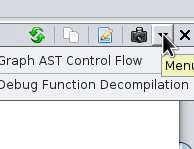I'm working on an automatic exploit-generation system for low level code, and I want to try it out on real world code.
I thought PCode might be a nice place to start, since it abstracts away over many of the details that for example x86 deals with.
I've installed Ghidra, and I am able to decompile binaries to C, but I am looking to get the PCode for a specific decompiled function from the binary.
There is a previous question on here that is related to this elsewhere, but the scripts that are linked no longer work with the latest version of Ghidra.
Could anyone provide some advice on how to get Ghidra to produce PCode after decompilation?
EDIT: For those interested, I've completed a script that dumps every decompiled function: https://github.com/niconaus/PCode-Dump/blob/main/PCodeDump.java
